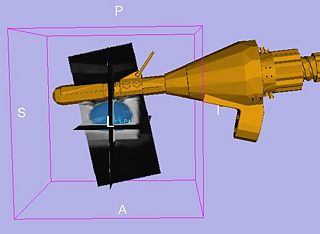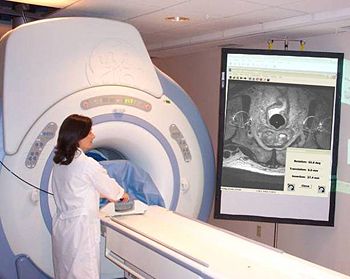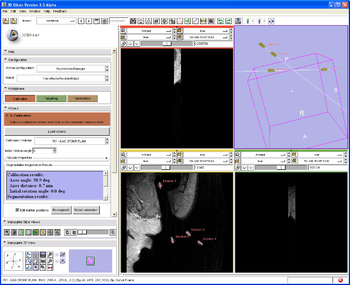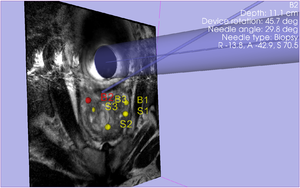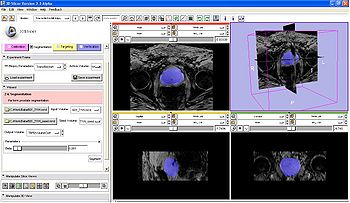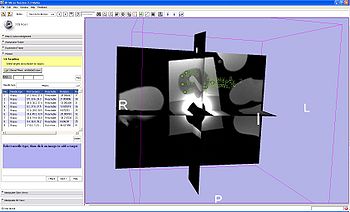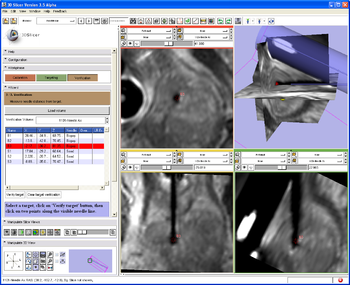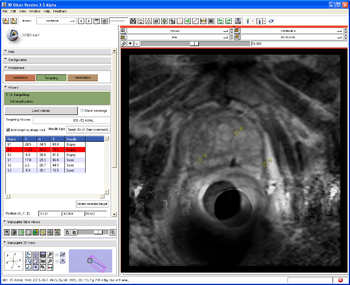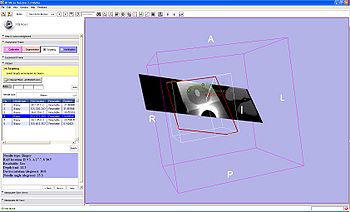Difference between revisions of "DBP2:Queens:Roadmap"
| Line 156: | Line 156: | ||
*PI: Gabor Fichtinger, Queen’s University (gabor at cs.queensu.ca) | *PI: Gabor Fichtinger, Queen’s University (gabor at cs.queensu.ca) | ||
*Co-I: Purang Abolmaesumi, Queen’s University (purang at cs.queensu.ca) | *Co-I: Purang Abolmaesumi, Queen’s University (purang at cs.queensu.ca) | ||
| − | *Software Engineer Lead: Siddharth Vikal, Queen’s University (vikal at cs.queensu.ca | + | *Software Engineer Lead: Andras Lasso, Queen’s University (lasso at cs.queensu.ca) |
| + | *Software Engineer: Siddharth Vikal, Queen’s University (vikal at cs.queensu.ca) | ||
*Software Engineer: David Gobbi, Queen’s University (dgobbi at cs.queensu.ca) | *Software Engineer: David Gobbi, Queen’s University (dgobbi at cs.queensu.ca) | ||
*JHU Software Engineer Support: Csaba Csoma, Johns Hopkins University, csoma at jhu.edu | *JHU Software Engineer Support: Csaba Csoma, Johns Hopkins University, csoma at jhu.edu | ||
Revision as of 17:38, 2 October 2009
Home < DBP2:Queens:RoadmapBack to NA-MIC Internal Collaborations, JHU DBP 2
Johns Hopkins Roadmap Project (Transrectal MRI-guided robotic prostate biopsy)
Objective
We would like to create an end-to-end application within the NA-MIC Kit to enable an existing transrectal prostate biopsy device to perform multi-parametric MRI guided prostate biopsy in closed-bore high-field MRI magnets.
This page describes the technology roadmap for robotic prostate biopsy in the NA-MIC Kit. The basic components necessary for this application are:
- Tissue segmentation: Should be multi-modality, correcting for intensity inhomogeneity and work for both supine and prone patients, all imaged with an endorectal coil (ERC).
- Registration: co-registration of MRI datasets taken at different times, in different body positions, and under different imaging parameters
- Prostate Measurement: Measure volume of all segmented structures
- Biopsy Device Parameters: Geometry, kinematics, and calibration/registration of the robot system must be available in some form. This capability is not currently part of the NA-MIC kit. The application will be modular, to enable use of different devices.
- Tutorial: Documentation will be written for a tutorial and sample data sets will be provided to perform simulated biopsies.
Roadmap
The primary goal for the roadmap is to develop an interventional module for Slicer3 for MRI-guided prostate biopsies. This module and the accompanying tutorial will serve as a template for interventional applications with Slicer3. The module will provide the necessary functionality for calibrating the robot to the MR scanner, planning biopsies, computing the necessary robot trajectory to perform each biopsy, and verification via post-biopsy images. We will obtain a biopsy plan from multi-parametric endorectal image volumes, executable with an existing prostate biopsy device. The system will be will be implemented under Slicer3 as an interactive application.
Workflow
- 1. Calibrate and register robot: Acquire a calibration volume, calibrate/register robotic device to MR coordinate system
- 2. Segment prostate: Acquire the target planning volume, segment prostate if necessary
- 3. Pick biopsy targets, perform biopsy: Pick targets, and perform biopsy
- 4. Validate target: Acquire validation volume, while needle still in and then provide needle axis to perform validation
Schedule
Data Collection: Done. Initial data available, hand segmented for ground truth.
Segmentation: We plan to use shape-based segmentation methods for the MRI prostate data. Several parts of the procedure have already been implemented with NA-MIC tools such as the conformal flattening procedure. Spherical wavelets for shape analysis are already available in ITK. Despeckling techniques will be used to enhance ultrasound imagery as a pre-processing step for segmentation of the prostate data.
System Implementation: Apart from the one research element (segmentation), the rest of the project is a massive software engineering effort, and will follow these major milestones and schedule:
- 10/15/2007: Application Workflow Development: Define the workflow for the application (David, Csaba, Gabor)
- 10/22/2007: Application Workflow Development: Create GUI templates for the workflow steps only till Calibration step (David)
- 12/15/2007: Device Modeling: Conversion of engineering data into VTK-viewable objects (David)
- 12/15/2007: Data Display: Provide display logic for targets and prostate outlines (David)
- 07/01/2008: Measurement Tools: Semi-automatic identification of fiducials via thresholding & centroids still not integrated inside SLICER (Csaba)
- 07/01/2008: Measurement Tools: Logic for robot registration with fiducials still not integrated inside SLICER (Csaba)
- 07/01/2008: Biopsy Planning/Targeting: Calculations for robot trajectory based on target position still not integrated inside SLICER (Csaba)
- 09/19/2008: Robot positioning: GUI targeting readouts for optical encoders (David, Siddharth)
- 11/10/2008: Robot positioning: Integrate optical encoders with our Slicer module (Siddharth)
- 11/20/2008: Application Workflow Development: Wizard GUI created for Targeting step, and Verification step (Siddharth)
- 11/20/2008: Software architecture compliance of module: Model View Controller pattern reflected in corresponding MRML, GUI, Logic (Siddharth)
- 11/26/2008: Measurement Tools: Integration of semi-automatic identification of fiducials in the SLICER module (Siddharth)
- 01/09/2009: Measurement Tools: Integration of prostate segmentation developed at Georgia Tech by Yi, Tennanbaum during the NAMIC project week in Utah (Siddharth, Yi): prostate segmentation AHM2009
- 02/02/2009: Measurement tools: Integration of Logic for robot marker registration based on segmentation in the SLICER module (Siddharth)
- 02/20/2009: Biopsy Planning/Targeting: Intergrated finding targeting parameters of robot for particular target (Siddharth)
- 03/10/2009: Biopsy Planning/Targeting: Ability to have multiple needles list, with each needle having multiple targets (Siddharth)
- 03/10/2009: Biopsy Planning/Targeting: Targets' list also implemented as fiducials lists for visualization of targets in 2d and 3D viewers (Siddharth)
- 03/20/2009: Software architecture compliance of module: MRML node updated to have all system state parameters ( volume nodes, fiducial lists (targets and markers), targeting parameters for each descriptor..) (Siddharth)
- 04/05/2009: Biopsy Planning/Targeting: On selecting target from the list, bring target to view in all viewers (Siddharth)
- 04/10/2009: Biopsy Planning/Targeting: Needle trajectory visualization (Siddharth)
- 04/15/2009: Application Workflow Development: Verification step GUI and functionality implemented (Siddharth)
- 04/23/2009: Application Workflow Development: Save experiment functionality implemented (Siddharth)
- 05/29/2009: Application Workflow Development: Planning window display (on secondary monitor) implemented (Andras)
- 05/29/2009: Application Workflow Development: 3D display of robot manipulator (with only a simple cylinder model), segmented calibration markers (using VR) implemented (Andras)
- 05/29/2009: Application Workflow Development: Targeting parameter display on planning window implemented (Andras)
- 06/12/2009: Prostate segmentatio module development: Created a separate, standalone module for prostate segmentation (ProstateSeg) from the existing algorithm code, which was integrated into the TRProstateBiopsy module (Andras, Yi)
Software
- The TRProstateBiopsy module is in the "Queens" directory of the NAMICSandBox - access online
Tutorial (end-to-end)
- Trans-rectal prosate biopsy module: TransRectalProstateBiopsyTutorial
- Trans-rectal prostate biopsy tutorial dataset: TransRectalProstateBiopsyTutorialDataset.zip
Publications
- Krieger A, Susil RC, Menard C, Coleman JA, Fichtinger G, Atalar E, Whitcomb LL, Design of A Novel MRI Compatible Manipulator for Image Guided Prostate Intervention, IEEE Trans. Biomed. Eng. 2005; 52(2):306-313
- Susil RC, Ménard C, Krieger A, Coleman JA, Camphausen K, Choyke P, Ullman K, Smith S, Fichtinger G, Whitcomb LL, Coleman NC, Atalar E, Transrectal Prostate Biopsy and Fiducial Marker Placement in a Standard 1.5T MRI Scanner, J Urol. 2006 Jan;175(1):113-20
- GS Fischer, A Krieger, I Iordachita, LL Whitcomb, and G Fichtinger, "MRI Compatibility of Robot Actuation Techniques -- A Comparative Study", Eleventh International Conference on Medical Image Computing and Computer-Assisted Intervention (MICCAI), Proceedings in Lecture Notes in Computer Science Vol. 5242, pp 509-517, Springer, 2008
- Siddharth Vikal, Steven Haker, Clare Tempany, Gabor Fichtinger, Prostate contouring in MRI guided biopsy, SPIE Medical Imaging 2009
- S. Gill, P Abolmaesumi, S Vikal, P Mousavi, G. Fichtinger, Intraoperative Prostate Tracking with Slice-to-Volume Registration in MRI, 20th International Conference of the Society for Medical Innovation and Technology (SMIT), Vienna, Austria, August 28-31, 2008, Electronic proceedings, ISBN 3-902087-25-0, pp. 154-158
- Mewes PW, Tokuda J, DiMaio SP, Fischer GS, Csoma C, Gobbi DG, Tempany CM, Fichtinger G, Hata N, An Integrated MRI and Robot Control Software for an MRI compatible Robot in Prostate Intervention, International Conference on Robotics and Automation - ICRA 2008, Pasadena, CA, pp 2950-2962, May 2008
Team and Institutes
- PI: Gabor Fichtinger, Queen’s University (gabor at cs.queensu.ca)
- Co-I: Purang Abolmaesumi, Queen’s University (purang at cs.queensu.ca)
- Software Engineer Lead: Andras Lasso, Queen’s University (lasso at cs.queensu.ca)
- Software Engineer: Siddharth Vikal, Queen’s University (vikal at cs.queensu.ca)
- Software Engineer: David Gobbi, Queen’s University (dgobbi at cs.queensu.ca)
- JHU Software Engineer Support: Csaba Csoma, Johns Hopkins University, csoma at jhu.edu
- NA-MIC Engineering Contact: Katie Hayes, MSc, Brigham and Women's Hospital, hayes at bwh.harvard.edu
- NA-MIC Algorithms Contact: Allen Tannenbaum, PhD, GeorgiaTech, tannenba at ece.gatech.edu
- Host Institutes: Queen's University & Johns Hopkins University
